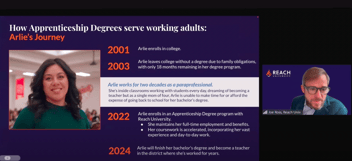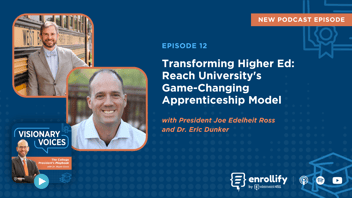Announcement | $1M Grant to Expand Apprenticeship Degrees in Behavioral Health
REACH UNIVERSITY SECURES $1M GRANT TO ACCELERATE THE EXPANSION OF APPRENTICESHIP DEGREES IN BEHAVIORAL HEALTH
THE GOODNESS WEB FOUNDATION FUNDING WILL SUPPORT REACH AND HEALTH SYSTEM PARTNERS ADDRESS A GROWING U.S. MENTAL HEALTH CRISIS
(OAKLAND, California) – February 20, 2025 – Reach University, a nonprofit university advancing apprenticeship degrees in care industries, today announced its plans to launch a stackable “Behavioral Health Pathway,” beginning with its existing Associate of Arts (A.A.) degree. Through a three-year, $1 million grant from The Goodness Web Foundation, a mental-health focused social impact philanthropy, Reach expects to expand its degree offerings to support schools, health systems and community organizations as they recruit and train frontline workers to become behavioral health professionals, addressing the nation’s growing mental health crisis.
Reach currently partners with 420 K-12 school systems in eight states to provide apprenticeship degree pathways for paraprofessionals and other school employees. Reach ensures employers can train high-potential staff on the job to fill specialized professional vacancies through a degree that is workplace-based, renders credit for work the learner does on the job, and is offered without student loan debt. Reach plans to leverage its expertise in scaling job-embedded degrees to serve an additional high-need care profession: behavioral health.
“Reach has achieved what traditional higher education has struggled to do at scale: deploy an affordable – yet rigorous –- degree program that works for working adults,” said Dr. Celine Coggins, CEO of The Goodness Web Foundation. “In our efforts to solve our nation’s mental health crisis through alternative funding pathways, we have found an innovative university partner that bridges the gap between a behavioral health worker’s present and future. There is data-backed efficacy and impact in Reach’s degree programs, and we couldn’t be more proud to fund their continued scale in the caring professions.”
A Mental Health Crisis Solution
The critical shortage of licensed behavioral health workers is exacerbating the nation's post-pandemic mental health crisis. In 2022, approximately 59 million (23%) U.S. adults reported a mental illness, but nearly half did not receive treatment due in part to limited provider access and coverage gaps. Over the next decade the Bureau of Labor Statistics (BLS) estimates an annual nationwide shortage of more than 80,000 licensed social workers (LSWs), and the Health Resources and Services Administration (HRSA) projects the nation will lack half of the behavioral health workforce required to meet demand by 2036.
Much of this talent is also needed in our nation's schools to address a growing youth mental health crisis. Similar to teaching, the behavioral health field offers a variety of entry-level positions that are “apprenticeable,” including roles such as behavioral health technician, substance abuse and mental health support specialist, community health worker, case manager, behavioral specialist, and recovery coach.
However, progressing from an entry-level apprenticeable role to a professional position remains a challenge, as the field lacks a clear, structured training pathway. This has historically made it difficult for universities and colleges to align curricula with job requirements. Apprenticeship degrees aim to define the pathway for talent, employers, and institutions of higher ed.
“The term ‘apprenticeable’ is something we should be talking about more as a nation,” said John Colborn, executive director for Apprenticeships for America. “From teaching to healthcare, technology, advanced manufacturing and more, we have employers with acute labor shortages and ‘apprenticeable’ roles that can train on the job to fill those key vacancies. Reach has pioneered the U.S. teacher apprenticeship degree and ensured others can do the same. It's a logical expansion to now help school and health systems identify ‘apprenticeable’ behavioral health roles, pave the pathway to degree and licensure attainment, and do it in a way that is beneficial for everyone involved.”
Apprenticeship Degrees for Behavioral Health
Much like teaching, behavioral health is experiencing a talent shortage at both the paraprofessional and professional levels, with mental health-related occupations projected to grow faster than the nation’s 3-percent average. Reach University’s employer-based apprenticeship degree addresses both short- and long-term talent needs through affordability and credential stackability, removing the financial, time, and transfer barriers to a degree completion and career progression for entry-level talent.
"We were the first in the country to offer behavioral health apprenticeships and have seen both their potential and the importance of an embedded degree in Washington,” said Laura Hopkins, executive director of the SEIU Healthcare 1199NW Multi-Employer Training Fund. “We are excited for Reach's expansion into this field and the support this pathway will offer for employers to develop their talent pipelines and workers to achieve their educational goals quicker and with higher quality."
Reach will initially support paraprofessionals in earning a job-embedded A.A., which includes a concentration in social science that is relevant to behavioral health. Similar to Reach’s teacher undergraduate programs, degree seekers will be paid by their employer as they complete their on-the-job degree. After grants and scholarships, the expected out-of-pocket contribution for a full-time undergraduate is $900 per year, or $75 per month, with no student loan debt.
Reach then expects to deploy a larger stackable undergraduate-to-graduate degree pathway (e.g., associate to bachelor’s to master's degree), subject to WSCUC accreditation approval.
Reach also anticipates partnering with behavioral health apprenticeship programs in peer counseling, addiction counseling, and other fields, as it aligns its job-embedded degree model to meet the estimated average of 42,000 openings through 2032. These new partnerships will complement the work of Reach’s National Center for the Apprenticeship Degree (NCAD), which is already collaborating with The College of New Jersey (TCNJ), Metropolitan State University of Denver, and Massachusetts Bay Community College (supported by Accelerate the Future and the Smith Family Foundation’s Massachusetts Apprenticeship Degree Project) to deploy behavioral health-related apprenticeship degree programs.
“Reach transforms jobs into degrees, providing care industries a clear pathway to train their current workforce, fill critical vacancies, and create upward economic mobility in their home communities,” said Joe E. Ross, president and CEO of Reach University. “Under a shared mission, we are grateful to The Goodness Web Foundation for supporting Reach’s apprenticeship degree expansion. Much like teaching, behavioral health has a potential talent pool hidden in plain sight, ready to fill critical professional roles with the right training and degree. From Reach to NCAD and our future behavioral health partners, we are bringing apprenticeship degrees to everyone, everywhere. And our nation’s communities will win as a result.”
Reach invites funders, state, and employer partners on the frontlines of mental and behavioral health to join us. Learn more by contacting partnerships@reach.edu or visiting https://reach.edu/partnerships.
ABOUT REACH UNIVERSITY
Reach University turns jobs into degrees, serving as our nation’s first and only nonprofit university fully dedicated to advancing on-the-job degrees and credentials, known as Apprenticeship Degrees. By fostering economic mobility, building careers and the workforce, and inspiring deeper learning through inquiry, dialogue, collaboration, and on-the-job practice, Reach, its National Center for the Apprenticeship Degree, and partners are actively solving America's labor shortages by creating fully-embedded pathways for high-potential individuals to earn degrees, credentials, and professional careers in their home communities. Reach currently operates in Alabama, Arkansas, California, Colorado, Georgia, Louisiana, Texas, and Tennessee.
ABOUT THE GOODNESS WEB (TGW)
The Goodness Web (TGW) is a 501(c)(3) nonprofit organization and a collaborative philanthropic fund. The Goodness Web connects a diverse community of result-oriented donors and partners who pool their resources and expertise to accelerate the most promising mental health initiatives to improve lives. TGW activates its extensive network – the 'Web' – to surface the most promising opportunities for investment, share learnings, and facilitate lasting connections. TGW is creating a new alternative to traditional philanthropy to radically change the trajectory, timeline, and impact in the mental health arena with an initial focus on youth.
Media Inquiries:
Lauren Bauml
Reach University
(512) 923-6136
LBAUML@REACH.EDU
– ### –

%20(1200%20x%20628%20px)%20(3).png?width=352&name=APPRENTICESHIP%202.0%20(LinkedIn%20Post)%20(1200%20x%20628%20px)%20(3).png)
